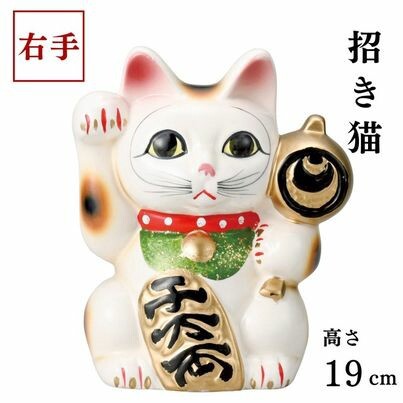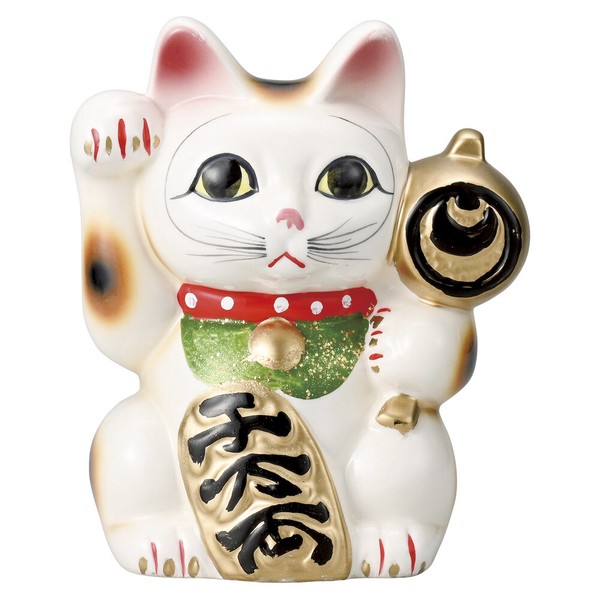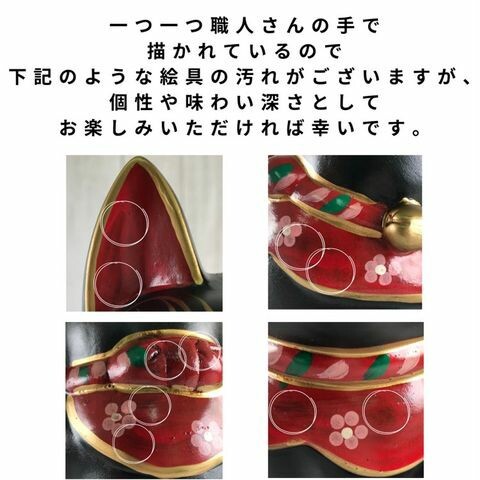


廠商詳情
Mitsui Pottery Inc.
| 地址 | 1084 Dachi-chou Toki-shi Gifu, 日本郵編:509-5401 |
|---|---|
| 負責人姓名 | Toshihiro Fujii |
| 年銷售額 | 非公開 |
| 公司人數 | 5 |
| 網址 |





其他人感興趣的
SD商品編號:8307020
| 詳情 | 價格 & 數量 | ||
|---|---|---|---|
| S1 |
SENMANRYO FUKUZUMATSU Neko (Small) Right: Convitation Cat 19cm 19cm
千万両福槌猫(小)右 招き猫 19cm 19cm
(87510-579)
|
(87510-579)
批發價: 僅限會員查看
1個/組
有庫存
|
|
| 尺寸 |
|---|
|
19厘米
|
| 商品規格 |
|---|
描述
| 〜招财猫已有 1300 年的历史。 一直以来,招财猫都是人们喜爱的吉祥物,它能带来生意兴隆、家庭幸福和顾客盈门。 虽然日本自古以来就有野猫栖息,但并没有我们今天所知的家猫宠物。日本奈良时代(710-794 年)就有了家猫。 据说,当时人们将猫放在船上,以保护佛经和书籍免受鼠害。 关于猫的最早记载见于平安时代早期(794-1185 年)的 "Nihon ryoiki "一书,在 "Pillow Book "和 "Travel of Genetic "中也有关于驯养猫的描述。枕上书 "和 "源氏物语 "中也有关于驯养猫的描述,这表明至少在平安时代,人们就已经熟悉猫了。 [白招财猫] 白色招财猫被认为能带来好运。 [举起右手的招财猫] 这里的 "福 "主要指金钱。这只招财猫非常适合希望增加财运和运气的人。 举起的手也有高低之分。手举过耳朵的称为[德周],手适度举过耳朵以下的称为[德周]。手举过耳的称为[耳举],手适度举过耳的称为[耳垂]。 人们认为,手伸得越长,招来的福气越远或越大,而手越短,招来的福气越熟悉或越小。小幸福。 招财猫的形象是手持神棒,但早期的招财猫并没有神棒,它们的衣领上大多挂着铃铛。招财猫身上画着钱币和吉祥语,如 "开运 "和 "福"。值得注意的是,随着时间的推移,"神额 "上的金额从[万两][千两]增加到[亿两]。 基本上,金额越少,就越被认为是年代久远。 东、西、南、北、南、东,放在哪里? 如果是商店,招财猫的基本摆放位置是店门口;如果是住家,招财猫的基本摆放位置是大门口。如果放在家里,也可以放在客厅或其他家人经常能看到的地方。 #日本制造 #Seto 器皿 请点击这里订购我们的产品目录,其中包含约 20,000 种商品。 |
更多
| 寄送方式 | 預計抵達時間 |
|---|---|
| Sea Mail | 此商品的出貨期未定。 |
| Air Mail | |
| EMS | |
| Pantos Express | |
| DHL | |
| UPS | |
| FedEx |
|
某些交易條件可能僅適用於日本
由于陶器的性质,可能有颜色上的差异。请欣赏每件作品的不同外观。
我们与一些制造商共享库存。 我们定期更新我们的库存,但可能会暂时缺货。 然而,有时我们可能别无选择,只能因库存暂时短缺而取消您的订单。 如果你想知道最新的库存状况,请联系我们。 |
一直以来,招财猫都是人们喜爱的吉祥物,它能带来生意兴隆、家庭幸福和顾客盈门。
虽然日本自古以来就有野猫栖息,但并没有我们今天所知的家猫宠物。日本奈良时代(710-794 年)就有了家猫。 据说,当时人们将猫放在船上,以保护佛经和书籍免受鼠害。
关于猫的最早记载见于平安时代早期(794-1185 年)的 "Nihon ryoiki "一书,在 "Pillow Book "和 "Travel of Genetic "中也有关于驯养猫的描述。枕上书 "和 "源氏物语 "中也有关于驯养猫的描述,这表明至少在平安时代,人们就已经熟悉猫了。
[白招财猫]
白色招财猫被认为能带来好运。
[举起右手的招财猫]
这里的 "福 "主要指金钱。这只招财猫非常适合希望增加财运和运气的人。
举起的手也有高低之分。手举过耳朵的称为[德周],手适度举过耳朵以下的称为[德周]。手举过耳的称为[耳举],手适度举过耳的称为[耳垂]。 人们认为,手伸得越长,招来的福气越远或越大,而手越短,招来的福气越熟悉或越小。小幸福。
招财猫的形象是手持神棒,但早期的招财猫并没有神棒,它们的衣领上大多挂着铃铛。招财猫身上画着钱币和吉祥语,如 "开运 "和 "福"。值得注意的是,随着时间的推移,"神额 "上的金额从[万两][千两]增加到[亿两]。 基本上,金额越少,就越被认为是年代久远。
东、西、南、北、南、东,放在哪里?
如果是商店,招财猫的基本摆放位置是店门口;如果是住家,招财猫的基本摆放位置是大门口。如果放在家里,也可以放在客厅或其他家人经常能看到的地方。
#日本制造
#Seto 器皿
请点击这里订购我们的产品目录,其中包含约 20,000 种商品。
The beckoning cat has long been loved as a good-luck charm that brings prosperity in business, happiness in the family, and the arrival of many customers.
Although wild cats have inhabited Japan since ancient times, there were no domestic cats as pets as we know them today. Cats as domesticated cats came to Japan during the Nara period (710-794). They came to Japan with Buddhism from China. It is said that they were carried on ships to protect Buddhist scriptures and books from rodent damage.
The earliest mention of cats is found in "Nihon ryoiki" written in the early Heian period (794-1185), and there are descriptions of domesticated cats in "Pillow Book" and "Tale of Genji", suggesting that cats were familiar to people at least in the Heian period.
[White beckoning cat]
White beckoning cats are believed to bring good fortune.
[Manekineko with its right hand raised]
A beckoning cat with its right hand raised is a [blessing] cat. The "good fortune" here refers mainly to money. This beckoning cat is perfect for people who wish to increase their money and luck.
There is also a difference in the height of the raised hands. Those with hands raised above the ears are called [te-chou], and those with hands modestly raised below the ears are called [te-shou]. It is believed that the longer the hands are extended, the more distant or great good fortune is invited, and the shorter the hands are, the more familiar or modest happiness is invited.
The image of a beckoning cat is that of holding a koban, but early beckoning cats did not have a koban, and most of them had a bell hanging from their collars. It is said that this bell gradually changed to a koban. The koban is painted with an amount of money and auspicious words such as "kaiun" (good luck) and "shofuku" (good fortune), directly reflecting the wishes of the beckoning cat. It is interesting to note that the amount of money depicted on the koban has increased over time from [senryo] [ten thousand ryo] [ten thousand ryo] to [billion ryo]. The more modest the amount, the older the koban is considered to be, basically.
Where do you put it, east, west, south, north, south, east? z
The basic place to place a beckoning cat is in front of a store if it is a store, or at the front door if it is a home. This is the place where you can invite good fortune and luck to come to you. If you place it at home, you can also place it in the living room or some other place where the family can see it often.
#Made in Japan
#Seto ware
Please click here to order our product catalog with approximately 20,000 items.